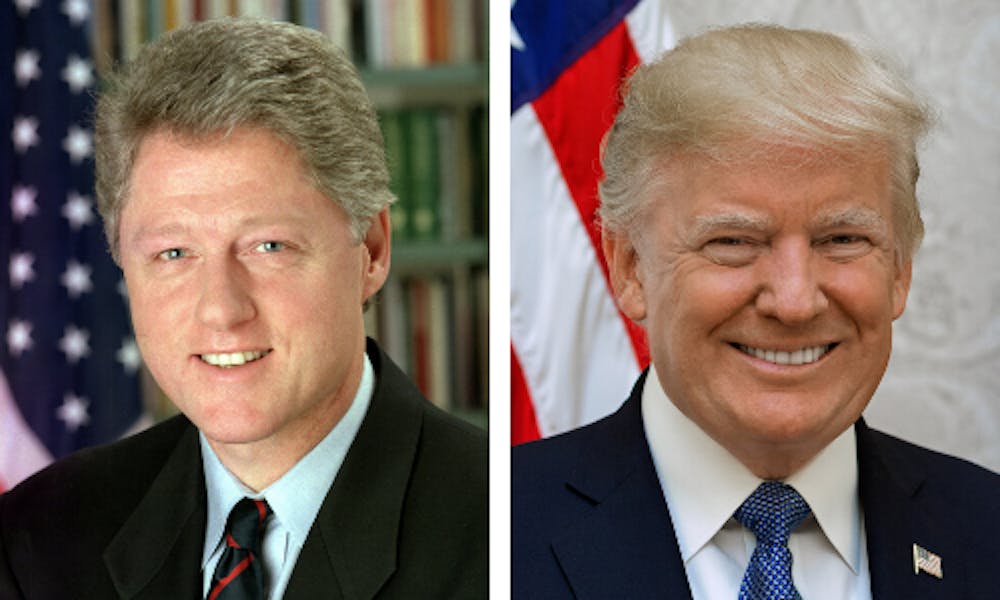Miami University’s political climate has changed quite a bit over the past 20 years and, in turn, so has the way students discuss major current events, such as impeachment.
On Feb. 5, the United States Senate acquitted President Donald Trump of abuse of power and obstruction of Congress, thus ending the lengthy impeachment process that has polarized Americans for several months.
Trump’s impeachment was set into motion in early September by an anonymous whistleblower complaint that alleged Trump had asked Ukranian authorities to influence the 2020 election in his favor. It is the third impeachment in United States history.
The first was in 1868 when Andrew Johnson was impeached on eleven different articles, but was ultimately acquitted by the Senate.
The second wasn’t until 1998, when Bill Clinton was impeached on charges of perjury and obstruction of justice. Clinton, too, was acquitted by the Senate.
Richard Nixon also faced impeachment in 1974, but resigned from office before Congress could vote on his charges.
John Rothgeb, professor of political science, has been at Miami during both Clinton’s and Trump’s impeachments — since 1985. He said that he never addressed either impeachment in his classes because they weren’t relevant to the classes he teaches — world politics, American foreign policy and American trade policy — and that his students seemed reluctant to bring up such a contentious topic.
“I think that [students] have their opinions, but they’re hesitant to talk to faculty because they don’t want to get into an argument,” Rothgeb said. “That doesn’t mean that I would argue with them, but they might think that I would.”
Rothgeb also said that many Miami students — and Americans in general — were somewhat disinterested in the two impeachments because of their constant media coverage.
“Today, you have 400 [television] stations, and you have news all the time, so people don’t pay nearly as much attention,” Rothgeb said. “When Clinton was being impeached, it was pretty much the same — you had 400 stations, which kind of kills the interest.”
By contrast, senior political science and history major Bridget Dickens said the constant media coverage simply makes it easier to pay attention and doesn’t diminish the interest.
“I get news updates from the New York Times and CNN, so that’s how I follow along with [the impeachment],” Dickens said. “I’d say that most people are paying attention, even if they think he shouldn’t have been impeached or that it was pointless.”
Enjoy what you're reading?
Signup for our newsletter
Christopher Kelley, another professor of political science who has been at Miami for both impeachments, agreed his students seem to have an interest in Trump’s impeachment. However, he said that he hasn’t encountered very many partisan discussions of the issue.
“I’ve never had an instance where students are screaming that it’s the most unfair thing that’s ever happened to a president or that Republicans are so blind that they can’t impeach a guy who’s so clearly guilty,” Kelley said. “It’s more an interest in the politics of the thing.”
However, Kelley said that the political climate at Miami was vastly different during Clinton’s impeachment and that partisanship was much more common back then.
“The campus in 1999 was far more conservative, and it was difficult to find people who were actively supporting democratic causes,” Kelley said. “Most students were Republicans, and they wanted to see the president impeached.”
Though Rothgeb said he hasn’t noticed this leftward shift in students’ ideologies, he did say that some people seemed to react to Clinton’s impeachment differently than Trump’s because its subject — an extramarital affair — was personal for many people.
The strong support for Clinton’s impeachment observed at Miami by Kelley differs greatly from national opinion at the time. According to data from the Pew Research Center, less than 30 percent of Americans supported Clinton’s removal from office prior to the House of Representatives’ proceedings.
Kelley added that the lack of passionate discussion about Trump’s impeachment may be due to the upcoming 2020 election, which has largely overshadowed the impeachment in importance. Clinton’s impeachment was different, as it occurred nearly 2 years before the next presidential election.
“Even though the two [impeachments] happened in close proximity to each other, we’re still talking about two very different time periods,” Kelley said.




